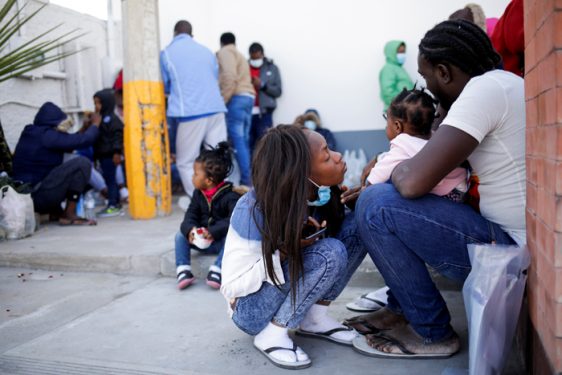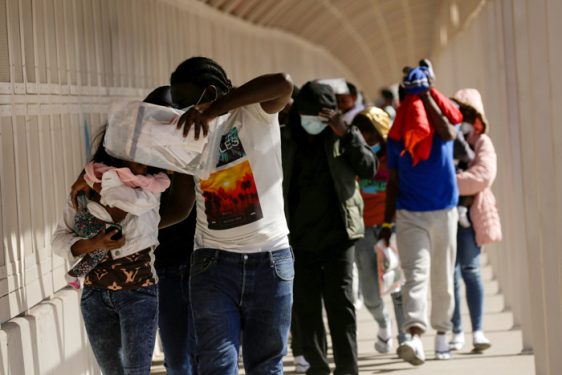WINDSOR TERRACE — While on the campaign trail in Miami this past October, then-presidential candidate Joe Biden promised to never quit on the Haitian American community.
During the stop in Miami’s Little Haiti neighborhood, Biden pledged, “I promise you there would be no quit on my part as your president making sure that the Haitian community has an even shot.”
But now, many Haitian immigrants are confused and anxious, wondering if deportation is imminent. Meanwhile, their homeland is roiled by sometimes violent political turmoil, a struggling economy, and delayed access to COVID-19 vaccines.
Some Haitians, like “Jacques” (not his real name) gained Temporary Protected Status (TPS) after a 2010 earthquake caused an estimated 160,000 deaths and $8.5 billion worth of damage to property and critical infrastructure.

TPS allows people to stay in the U.S. for 18-month stretches — for which they can apply for renewal — if their countries are hit with natural disasters or other strife, such as warfare.
Jacques recently told Currents News he has been in the U.S. since 2012 through TPS. But he, like other Haitians, is unsure how Biden will handle the program going forward.
“I (am) very afraid, scared because I don’t know exactly when they’re going to deport me,” Jacques said, speaking in Creole through a translator.
Former President Donald Trump tried to end TPS for Haiti, believing conditions had improved there.
But conditions are getting worse in Haiti, said Retired Auxiliary Bishop Guy Sansaricq, who is from Haiti. He cited ongoing political upheaval over alleged corruption in the administration of President Jovenel Moïse, who has refused to leave office even though his term expired in February.
On April 14, Haitian Prime Minister Joseph Jouthe resigned without giving a reason, becoming the eighth prime minister since 2015 to leave office amid national turmoil.
Bishop Sansaricq also noted that an illicit industry of kidnapping for ransom persists in Haiti.
On April 11, kidnappers grabbed five Catholic priests and two nuns in a suburb of Port-au-Prince. The captors demanded $1 million in ransom for the group, which included a priest and a nun from France. None were free as of this writing.
“Some [kidnappers] just want to make money, but some politicians are inciting these practices,” Bishop Sansaricq said. “The government doesn’t seem to be able to control them. This creates a lot of insecurity. People are afraid to go out.”
Confusion in the Caribbean nation has grown in recent weeks as expulsions of Haitians from the U.S. has continued, despite Biden’s promises of sweeping immigration reform, according to a new report, “The Invisible Wall.”

“More Haitians have been removed to Haiti in the weeks since President Joe Biden and Vice President Kamala Harris took office than during all of Fiscal Year 2020,” said the report.
The study, published jointly by the Haitian Bridge Alliance, the Quixote Center, and the UndocuBlack Network, also stated that, in February alone, the Biden administration sent 1,200 people back to Haiti.
These expulsions seem to be commensurate with a recent surge of Haitian immigrants at the U.S.-Mexico border in January and February. Immigrants said they were motivated to seek refuge in the U.S. by Biden’s promise to overhaul his immigration policies.
But, just as Trump did, Biden has sent Haitians back to their homeland, citing Title 42, a provision that former President Trump invoked to prevent a COVID-19 “super-spreader” situation at U.S. points of entry.
Paul Dorsinville, also a native of Haiti, is a deacon at Sacred Heart Parish in Cambria Heights, Queens, and an immigration paralegal who helps Haitian immigrants.
He said Haitians are traveling to Central or South American nations, planning to move north to the United States, and “expecting a welcome by the Biden Administration.” When they learn the border is closed, they languish in Mexico, not knowing what to do next.
“If somebody called me and asked if it is a good idea to come here, I would not encourage that person,” Deacon Dorsinville said.
As for Jacques, he hopes for a resolution soon, adding: “My message to the (U.S.) government is to try to take the TPS cases under consideration and try to legalize the people here with TPS.”
U.S. Homeland Security Secretary Alejandro Mayorkas said expulsions are underway for single adults and families under the Title 42 authority of the Centers for Disease Control and Prevention. He added, however, that this is happening because the border is closed while the Biden administration tries to undo the previous eight years of Trump administration immigration policies.
“The prior administration completely dismantled the asylum system,” Mayorkas said. “The system was gutted, facilities were closed, and they cruelly expelled young children into the hands of traffickers. We have had to rebuild the entire system, including the policies and procedures required to administer the asylum laws that Congress passed long ago.”
Meanwhile, the new administration hasn’t said much about the future of TPS for refugees from Haiti, Nicaragua, Sudan, and El Salvador.
“It is all under review at this point in time,” White House Press Secretary Jen Psaki said at a recent press briefing. “Obviously, the president has talked about his own commitment to reinstating TPS in certain cases.”
But, she added, “The review has not been completed at this point in time.”
Still, Haitian immigrants worried about the status of TPS do have some breathing room, according to Jory Charles, an immigration lawyer who works for the Hollis, Queens-based Haitian Americans United for Progress (HAUP) Inc. Charles explained that Trump’s efforts to end TPS for Haiti are tied up in a federal lawsuit. Meanwhile, the Department of Homeland Security has extended TPS protection for qualifying Haitians until Oct. 5.
Charles, who joined HAUP Inc. in 2013, said he is optimistic immigration reform will happen, based on the current bi-partisan recognition that change is needed.
While Congress undergoes that process, and the courts deal with the lawsuits, Charles is telling clients to keep playing by the rules to ensure their status for TPS stays valid. That includes timely filing of applications for 18-month TPS extensions and paying the required fees.
“It’s going to be a long fight,” Charles said. “But one of the other benefits (of TPS) is you’re allowed to get a Social Security number, which means you’re much more likely to pay taxes. Almost all my clients adhere to that. They can say that ‘Hey, I have my tax returns to show that I’ve remained in the United States for a certain length of time.’ “
“These people have been operating under the assumption that if they do everything by the book, that it’ll give them a chance,” he added, “the best chance possible to be conferred whatever (TPS) benefits that happen in the future.”
This article contains information reported by Emily Drooby of Currents News.

Charles, we’re on the same boat!